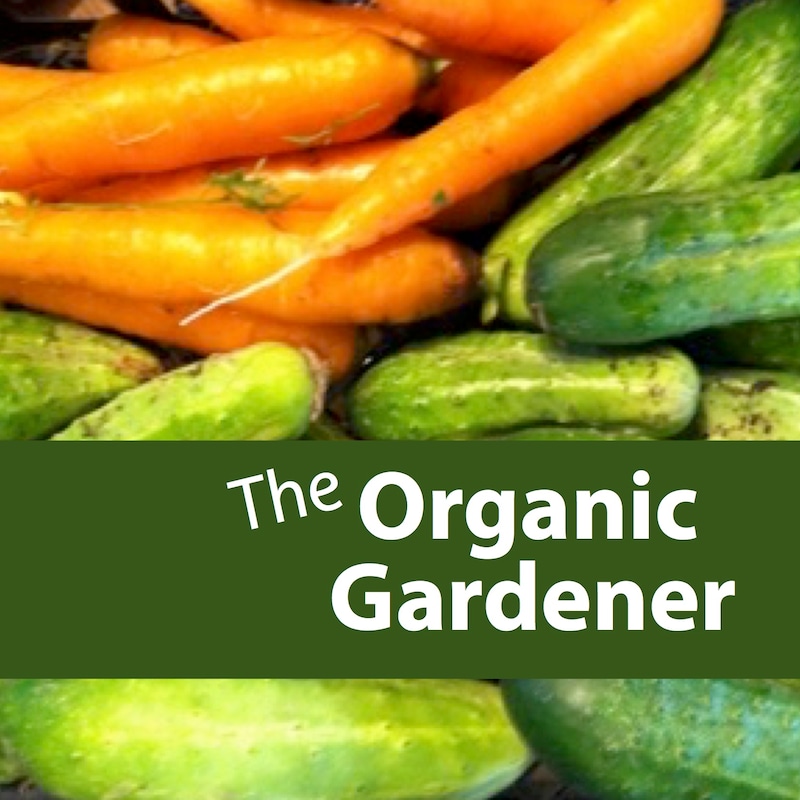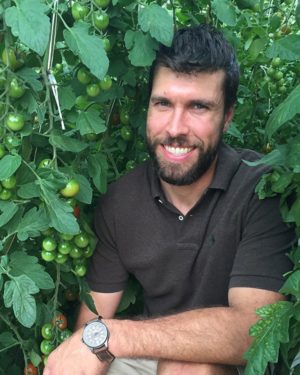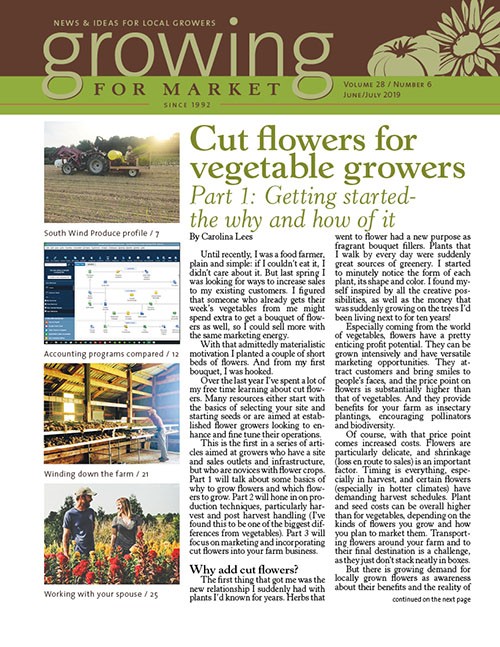
Shownotes
To win a copy of Andrew’s Book answer this poll where you can enter the raffle. And remember you can get a 20% discount by using the code: garden on a subscription to Andrew’s awesome publication Growing for Market magazine or any of his books or the books in their online store. I know you are going to love this interview as much as I did. Remember to share this episode with a friend!
The Organic No-Till Farming Revolution: High-Production Methods for Small-Scale Farmers
The Greenhouse and Hoophouse Grower’s Handbook: Organic Vegetable Production Using Protected Culture
Andrew Mefferd is editor of Growing for Market magazine.

He has spent 15 years working on farms in six states, including a year working on a no-till research farm, and worked for seven years in the research department at
Johnny’s Selected Seeds .
He travels around the world consulting with researchers and farmers on the best practices in greenhouse growing and sustainable agriculture. He is the author of The Greenhouse and Hoophouse Grower’s Handbook, and has a passion for promoting local farming movements. He lives and farms in Cornville, Maine.
The Greenhouse and Hoophouse Grower’s Handbook: Organic Vegetable Production Using Protected Culture
coupon code for your listeners for either the book or a subscription!
OGP
New Society willing to give away a book its really up to you to decide how to give the book away!!
I’m so excited to hear that because I usually would give the copy you gave me away but it’s one of the ones I really want to keep in my library. Well I love my listeners that’s amazing! They are all dedicated to growing a greener future by saving the planet not just growing food but growing an organic oasis.
I’m not from Maine, and moved here and love it! So I feel I can recommend it.
Maine is going to have its bicentennial, the little town we live in was founded in the 1800s
very old
small farm state
because we don’t have the big expanses of land, like out west
the place was carved up into little farmsteads
and it’s not flat
remains that way.
a lot like the farm I live on
- house and a barn
- 30-40 acres of open land
- Another 70 or something of woods
People farm and get their firewood
it could be a good deal
sounds like a fixer upper
You would have to do things to it, I think that as long as you know that going into it, and
Yesterday even my mom went to a CBD oil place with her buddies, we are thinking we could have a hemp field and we are thinking the building could be a school. We could have some vegetables but mostly hemp. IDK it’s the first place we’ve ever thought of moving to from our place… who knows it could be sold by now. Let’s talk about you!

Tell us a little about yourself.
Yeah sure! I would say that I grew up in the state of VA in northern up close to Washington DC
where it’s very suburban. My entry point into farming really was through gardening. We had a garden there were I grew up in VA and I had a farm one generation back in my family. My dad’s mom had a fairly large farm in PA
As I grew up I got more and more interested in the growing side of things, which started out as a garden. We had this compost pile for years at my house
sort of Mount Compostmore!
kept piling stuff up and up
huge compost pile and finally I said we should have a garden! One of myfirst gardening experiences was spreading the compost out!
We were, we wanted to have a garden and ended up just spreading the compost pile on the garden site
We spread it out and it ended up being a really great garden!
I love that story! You don’t ave to have a garden to save your compost maybe you will down the line!
right!
Compost is like fine wine
the older it gets the better it is.
We just wanted to get ready to have a garden
potentially
organic matter
filing it up
sitting there rotting and when we were ready to have a garden!
there it was
that was kind of my entry point
as I got more and more interested in growing
I thought that I wanted to have a farm
I went to school for journalism and my first few jobs as apprenticeship in journalism I was in a cubical all day long
this is not what I want to do
I want to be outside
talking to my brother about organic food. I had always
ignorantly
blissfully assumed that that government was making food safe
whatever is sprayed on the food is safe
talking to my brother
I can’t believe they let you spray that on food!
it made the most sense to work on a farm in the neck of the woods
the apprentice circuit
Did an apprenticeship on a farm in Pennsylvania
not wanting to spend all day in a cubicle
met my wife there and we did what she calls the apprentice circuit
That fall at the end of the apprenticeship in PA we took a road trip and visited farms in the country
Ended up picking a farm in California, so we went straight to the fall season on a farm in AA
started a
Mediterranean
jan 21st one of the first jobs was
- bucking up the olive wood into firewood
from there we went to Washington state
research farm for VA tech
We did start a farm in PA and that’s a long story and we loss the use of that land
- bounced around
- more apprenticeships in upstate in NY and then up to Maine and actually out on the coast of Maine
now I do live on a farm in Cornville, Maine
this is
our farm is about 45 min from Johnny’s research farm which is longer then I wanted to commute and we live in a rural area
that’s like where we are
- rural people can relate
- a lot of suburban people can relate because
which is like northern VA I just couldn’t take that too much time in the car
mainly to farm
one thing a lot of growers do is to work for johns in the winter
if you called into Johnny’s and said you were a potential grower I would have potentially helped you make that order and this job in the research department became available
running trials on different and tomatoes are my spirit crop
I applied for it and I sure enough I got that
I ended up at Johnny’s for seven years in the research department running trials on tomatoes
I ended up getting into greenhouse trialling as well
as you know the national
funding a lot of high tunnels
increasing demand for recommendations
People would build one and call us up at Johnny’s and saying I got my high tunnel up now what do I plant in it and
that led to my first book
The Greenhouse and Hoophouse Grower’s Handbook: Organic Vegetable Production Using Protected Culture
because not only was I putting a lot of energy for Johnny’s but also putting a lot of it into our own farm when you consider that we moved from Pennsylvania to Maine.
My favorite thing is tomatoes
place where you have a nice long growing season to a place where in my mind it’s not commercially worthwhile
They take so long to ripen, our season is so short.
I think that’s a lot like us but now isn’t Jean Martin Fortier north of you or is his season different? I know he says greenhouse tomatoes are his number one crop in his book:
 The Market Gardener: A Successful Grower’s Handbook for Small-Scale Organic Farming
The Market Gardener: A Successful Grower’s Handbook for Small-Scale Organic Farming
His season is probably similar. That’s why he’s growing them in a hoophouse, I know he has a nice greenhouse too. I think that’s it, growers in these northern areas really need to use season extension to make those crops profitable.
Here we have all the
- diseases
- heat humidity
- splits
and to make matters worse you can’t plant them in the field to June, by the time those big beefsteaks are starting to ripen the weather’s cooling back off
lots of gardeners grow large fruited tomatoes up here, but it’s the kind of thing where you are a commercial growers trying to make a profit it
If you only pick
That’s a decision we made and what I know most of the commercial growers are producing them indoors.
i have been to one of his places, he is more or less due west, we’re in central Maine and he’s just over the border from NY. I would guess that he has a similar climate
There’s a lot of demand for those local tomatoes
I think protected culture instead of trying to grow them.
I think it’s his hoophouse tomatoes.
I continue to be obsessed with greenhouse tomatoes but I did leave Johnny’s to take over the Magazine, Growing for Market which is something I had written for from time to time, leading up to taking it over.
IDK how familiar your readers are
We are now in our 28th year
Lynn Byzanski, she started as a flower farmer in Kansas
She wrote the book:
| The Flower Farmer: An Organic Grower’s Guide to Raising and Selling Cut Flowers, 2nd Edition |
I remember buying that book 15 years ago when I was at VA Tech, getting close to the part of start of our farm,
She started the magazine 28 years ago now
3 years ago she was ready to pass it on, asked me if I would be interested
When I asked her why, she said cause I was already writing for the magazine
I thought it was a great opportunity
small publication
not affiliated
kind of like a family business
she wanted someone to take it over that was writing for the magazine so they would continue to do so
editor to write for it
since I was already
Growing for Market – for direct to market farmers
It’s something we subscribe to for over a decade and really the only publication specifically for direct-to-market farmers.
- farmers market
- farm stand
- CSA
- those kind of...






